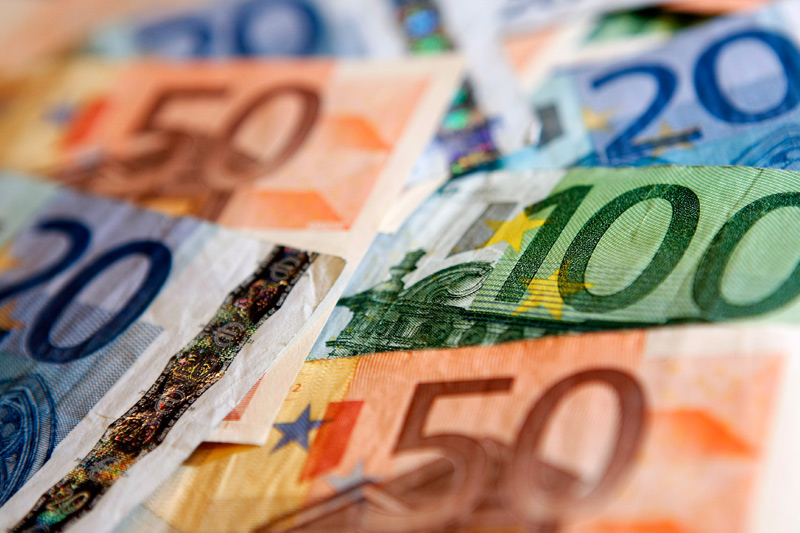Investing.com - The euro pushed higher against its major counterparts on Tuesday, after better-than-expected German economic growth numbers helped support market sentiment but the single currency remained vulnerable amid ongoing concerns over a possible Greek exit from the euro zone.
During European late morning trade, the euro was up against the U.S. dollar, with EUR/USD gaining 0.26% to hit 1.2853.
The euro found support after preliminary data showed that Germany’s economy expanded more-than-expected in the first quarter, indicating that the euro zone’s largest economy is weathering the effects of the crisis in the region.
Germany’s gross domestic product grew by a seasonally adjusted 0.5% in the three months to March, above expectations for a growth of 0.1%.
A separate report showed that the ZEW index of German economic sentiment deteriorated significantly more-than-expected this month, declining for the first time in six months.
The ZEW Centre for Economic Research said that its index of German economic sentiment declined to 10.8, from April’s reading of 23.4. Analysts had expected the index to decline to 19.0 in May.
Meanwhile, official data showed that the euro zone avoided a recession in the first quarter, as GDP growth remained flat, defying expectations for a contraction of 0.2%. The euro zone economy contracted by 0.3% in the fourth quarter of 2011.
Sentiment on the single currency remained fragile amid fears that last ditch talks aimed at forming a government in Greece would fail after a more than week-long political stalemate fuelled fears over the country’s ability to uphold its financial commitments and its possible exit from the euro zone.
Greece’s GDP contracted at an annualized rate of 6.2% in the first three months of 2012, official data showed.
The single currency eased against the pound but remained within striking distance of a three-and-a-half year low, with EUR/GBP climbing 0.36% to hit 0.7996.
The pound was largely unchanged after official data showed that the U.K.’s trade deficit remained unchanged at GBP8.6 billion in March.
The euro higher against the yen, with EUR/JPY climbing 0.36% to hit 102.75 and remained little changed against the Swiss franc EUR/CHF dipping 0.01% to hit 1.2010.
Elsewhere, the shared currency was mixed against the Canadian, Australian and New Zealand dollars, with EUR/CAD dipping 0.04% to hit 1.2866, EUR/AUD slipping 0.22% to hit 1.2848 and EUR/NZD rising 0.27% to hit 1.6554.
Earlier Tuesday, the minutes of the Reserve Bank of Australia’s last meeting said that “the risks emanating from Europe continue to cloud the global outlook;” and added that “inflation is likely to remain in the lower half of the target range over the foreseeable future.”
On May 1, the RBA cut its benchmark interest rate to a two-year low of 3.75% to help boost growth.
Later in the day, the U.S. was to publish official data on retail sales and consumer price inflation, as well as a report on manufacturing activity in New York.
During European late morning trade, the euro was up against the U.S. dollar, with EUR/USD gaining 0.26% to hit 1.2853.
The euro found support after preliminary data showed that Germany’s economy expanded more-than-expected in the first quarter, indicating that the euro zone’s largest economy is weathering the effects of the crisis in the region.
Germany’s gross domestic product grew by a seasonally adjusted 0.5% in the three months to March, above expectations for a growth of 0.1%.
A separate report showed that the ZEW index of German economic sentiment deteriorated significantly more-than-expected this month, declining for the first time in six months.
The ZEW Centre for Economic Research said that its index of German economic sentiment declined to 10.8, from April’s reading of 23.4. Analysts had expected the index to decline to 19.0 in May.
Meanwhile, official data showed that the euro zone avoided a recession in the first quarter, as GDP growth remained flat, defying expectations for a contraction of 0.2%. The euro zone economy contracted by 0.3% in the fourth quarter of 2011.
Sentiment on the single currency remained fragile amid fears that last ditch talks aimed at forming a government in Greece would fail after a more than week-long political stalemate fuelled fears over the country’s ability to uphold its financial commitments and its possible exit from the euro zone.
Greece’s GDP contracted at an annualized rate of 6.2% in the first three months of 2012, official data showed.
The single currency eased against the pound but remained within striking distance of a three-and-a-half year low, with EUR/GBP climbing 0.36% to hit 0.7996.
The pound was largely unchanged after official data showed that the U.K.’s trade deficit remained unchanged at GBP8.6 billion in March.
The euro higher against the yen, with EUR/JPY climbing 0.36% to hit 102.75 and remained little changed against the Swiss franc EUR/CHF dipping 0.01% to hit 1.2010.
Elsewhere, the shared currency was mixed against the Canadian, Australian and New Zealand dollars, with EUR/CAD dipping 0.04% to hit 1.2866, EUR/AUD slipping 0.22% to hit 1.2848 and EUR/NZD rising 0.27% to hit 1.6554.
Earlier Tuesday, the minutes of the Reserve Bank of Australia’s last meeting said that “the risks emanating from Europe continue to cloud the global outlook;” and added that “inflation is likely to remain in the lower half of the target range over the foreseeable future.”
On May 1, the RBA cut its benchmark interest rate to a two-year low of 3.75% to help boost growth.
Later in the day, the U.S. was to publish official data on retail sales and consumer price inflation, as well as a report on manufacturing activity in New York.
